人教版初中英语知识点介词
2020年人教版初中英语介词短语及固定搭配基本用法精讲精练

in表一段时间,用于年、月、世纪、四季或泛指一天的上午、下午、晚上等前in May在五月
in summer/winter在夏天/冬天
in the morning在早上
介词用法示例
for
动作延续贯穿整个过程,后接时间段,谓语动词须用延续性动词for a long time很长一段时间for two days两天
Don’t stay insidesuch a sunny morning. Let’s go out to enjoy the gentle wind and the sweet flowers.
A. onB. inC. fromD. at
Our reading club shares ideas with each otherone hour every Tuesday.
公交车吗?
4. as(通用卷2016.42)
作为,以……身份,表示事实。如:
Let me speak to you as a father.让我以一个父亲的身份对你讲
话。
5. into
(1)进入,到……里面。如:
Shall we go into the garden?我们去花园里好吗?(2)成为,变成。如:
in a low voice低声地2. by, in与on表示交通方式
(1)in/on+限定词+交通工具。如:in/on a bus乘公共汽车
(2)by+交通工具。如:by bike骑自行车;by bus乘坐公共汽车
Her mother goes to workbus every morning.
A. byB. atC. onD. in
人教版初中英语重点短语_语法_句型复习大全
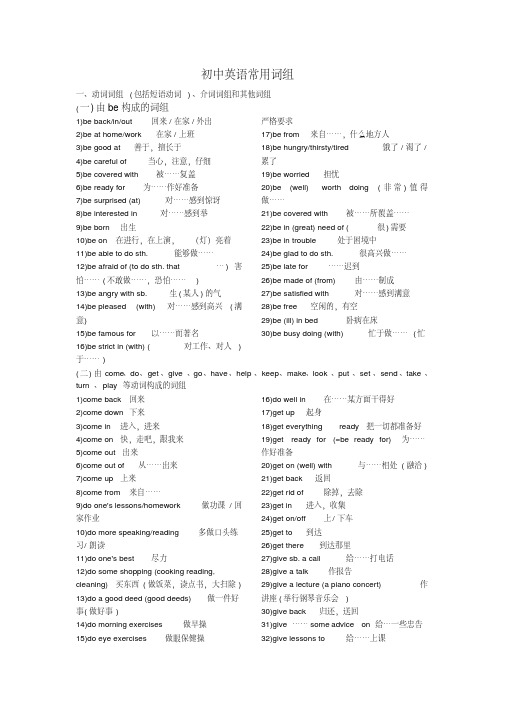
初中英语常用词组一、动词词组(包括短语动词)、介词词组和其他词组(一)由be构成的词组1)be back/in/out 回来/在家/外出2)be at home/work 在家/上班3)be good at 善于,擅长于4)be careful of 当心,注意,仔细5)be covered with 被……复盖6)be ready for 为……作好准备7)be surprised (at) 对……感到惊讶8)be interested in 对……感到举9)be born 出生10)be on 在进行,在上演,(灯)亮着11)be able to do sth. 能够做……12)be afraid of (to do sth. that…) 害怕……(不敢做……,恐怕……)13)be angry with sb. 生(某人)的气14)be pleased (with) 对……感到高兴(满意)15)be famous for 以……而著名16)be strict in (with) (对工作、对人)严格要求17)be from 来自……,什么地方人18)be hungry/thirsty/tired 饿了/渴了/累了19)be worried 担忧20)be (well) worth doing (非常)值得做……21)be covered with 被……所覆盖……22)be in (great) need of (很)需要23)be in trouble 处于困境中24)be glad to do sth. 很高兴做……25)be late for ……迟到26)be made of (from) 由……制成27)be satisfied with 对……感到满意28)be free 空闲的,有空29)be (ill) in bed 卧病在床30)be busy doing (with) 忙于做……(忙于……)(二)由come、do、get、give、go、have、help、keep、make、look、put、set、send、take、turn、play等动词构成的词组1)come back 回来2)come down 下来3)come in 进入,进来4)come on 快,走吧,跟我来5)come out出来6)come out of 从……出来7)come up 上来8)come from 来自……9)do one's lessons/homework 做功课/回家作业10)do more speaking/reading 多做口头练习/朗读11)do one's best 尽力12)do some shopping (cooking reading, cleaning)买东西(做饭菜,读点书,大扫除) 13)do a good deed (good deeds)做一件好事(做好事)14)do morning exercises 做早操15)do eye exercises 做眼保健操16)do well in 在……某方面干得好17)get up 起身18)get everything ready 把一切都准备好19)get ready for (=be ready for) 为……作好准备20)get on (well) with 与……相处(融洽)21)get back 返回22)get rid of 除掉,去除23)get in 进入,收集24)get on/off 上/下车25)get to 到达26)get there 到达那里27)give sb. a call 给……打电话28)give a talk 作报告29)give a lecture (a piano concert)作讲座(举行钢琴音乐会)30)give back 归还,送回31)give……some advice on 给…一些忠告32)give lessons to 给……上课33)give in 屈服34)give up 放弃35)give sb. a chance 给……一次机会36)give a message to……给……一个口信37)go ahead 先走,向前走,去吧,干吧38)go to the cinema 看电影39)go go bed 睡觉(make the bed 整理床铺)40)go to school (college) 上学(上大学)41)go to (the) hospital 去医院看病42)go over 过一遍,复习/ go over to 朝……走去43)go~fishing/skating/swimming/shopping 去钩鱼/滑冰/游泳/买东西44)go home (there) 回家去(去那儿)45)go round 顺便去,绕道走46)go up 上去47)go out for a walk 外出散步48)go on (doing) 继续(做……)49)go on with one's work 继续某人的工作50)go upstairs/downstairs 上/下楼51)(the lights) go out (灯)熄了52)have a lesson (lessons)/a meeting 上课/开会53)have a football match (basketball match) 举行一场足球(蓝球)赛54)have dictation 听见55)have a try 试一试56)have a good/wonderful time 玩得很高兴57)have a lecture (a piano concert) 听讲座(听钢琴音乐会)58)have a report (talk) on 听一个关于……的报告59)have a glass of water (a cup of tea)喝一杯水,(一杯茶)60)have breakfast/lunch/supper 吃早饭/午饭/晚饭61)have a meal (three meals) 吃一顿饭(三餐饭)62)have a dinner 吃正餐63)have bread and milk for breakfast早饭吃面包和牛奶64)have (have got) a headache 头痛65)have a fever 发烧66)have a cough (a cold) 咳嗽(感冒)67)have a look (at) 看一看……68)have a rest (a break) 休息一会儿(工间或课间休息)69)have a talk 谈话70)have a swim/walk 游泳/散步71)have sports 进行体育锻炼72)have a sports meet (meeting) 开运动会73)have something done 让人(请人)做……74)have a test/an exam 测验/考试75)have an idea 有了个主意76)had better do sth. (not do sth.) 最好做……(最好不要做……)77)have a word with 与……谈几句话78)help sb. with sth. help sb. do sth.在……方面帮助……帮助……做79)help oneself to some chicken/fish/meat 请随便吃点鸡/鱼/肉80)help each other 互相帮助81)keep up with 跟上……,不落后于……82)keep silent/quiet 保持沉默/安静83)keep sb. doing sth. 使……一直做……84)keep one's diary 记日记85)make a noise (a lot of noise, muchnoise, noises)吵闹(十分嘈杂,响声)86)make a living 谋生87)make sb. do sth. 迫使某人做……88)make faces (a face)做鬼脸89)make friends (with)与……交朋友90)make a mistake (mistakes)犯错误91)make room/space for 给……腾出地方92)make a sentence (sentences)with 用……造句93)make a fire 生火94)be made from/of 由……制成95)be made in 在……地方制造96)look out of (outside) 往外看(看外面)97)look up a word (in the dictionary) 查字典98)look up 往上看,仰望99)look after 照管,照看,照顾100)look for 寻找101)look like 看上去像102)look fine/well/tired/worried 看起来气色好/健康/疲劳/忧虑103)look out 当心,小心104)look on …as…把……当作……看待105)look around 朝四周看106)look at 看着……107)put on 穿上(衣服),戴上(帽子),上演(戏剧)108)put up 建造,搭起,挂起,举起,张帖109)put into 使进入,输入110)put one's heart into 全神贯注于111)put…down…把……放下112)put…into…把……译成113)set up 竖起,建起114)set off 出发,动身115)set out 出发116)set an example for 为……树立榜样117)send for 派人去请(叫)118)send out 放出,发出119)end up 把……往上送,发射120)take one's advice 听从某人劝告121)take out 拿出,取出122)take down 拿下123)take place 发生124)take one's place 坐……的座位,代替某人职务125)take the place of 代替……126)take a walk/rest 散步/休息127)take it easy 别紧张128)take sth.with sb. 随身带着129)take sb. to a park/London for one's holidays 带某人去公园/伦敦度假130)take care of 关心,照顾,保管131)take a look (a last look) at 看一看(最后看一眼)132)take an exam 参加考试133)take away 拿走134)take back 收回,带回135)take hold of 抓住……136)take off 脱下(衣,帽,鞋等)拿掉137)take (an active) part in (积极)参加(活动)138)take photos 拍照139)take some medicine 服药140)take a bus/train, boat/ 乘公共汽车,火车/船141)turn on 开,旋开(电灯,收音机等) 142)turn off 关上(电灯,收音机等) 143)turn in 交出,上交144)turn…into…变成145)turn to 翻到,转向146)turn down (把音量)调低147)turn…over 把……翻过来148)play basketball 打篮球,football 踢足球,volleyball 打排球149)play games 做游戏150)play the piano (the violin) 弹钢琴(拉小提琴)151)play with snow 玩雪152)play a joke (on) 对……开玩笑(三)由其他动词构成的词组153)think over 仔细考虑154)arrive at/in a place 到达某处155)eat up 吃完,吃光156)do well in 在……干得好157)enjoy doing sth. like doing sth. 喜欢做某事喜欢干某事158)find out 发现,查出(真相等)159)finish off 吃完,喝完160)stop doing sth. 停止做某事161)stop to do sth. 停下来去做某事162)hold a meting 举行会议163)hold up 举起164)hurry up 赶快,快点165)enter for 报名参加166)laugh at 嘲笑167)be used to 习惯于168)used to 过去常常169)wake…up 唤醒170)work out 算出二、动词短语、介词短语和其他词组1)ask for 向……要……,请求2)ask for leave 请假3)send for 派人去请(叫)4)pay for 付……的款5)wait for 等候6)thank for 为……感谢7)apologize to sb. for sth. 为某事向某人道歉8)look for 寻找9)leave…for 离开……去……10)fall off 跌落11)catch cold 着凉,伤风12)catch up with 赶上13)agree with sb. 赞成,同意某人的意见14)filled……with 把……装满15)tell sb. about sth. 告诉某人某事16)talk about 谈论……17)think about 考虑……18)worry about 担忧……19)look after 照料20)run after 追赶,跟在后面跑21)read after 跟……读22)smile at 对……微笑23)knock at 敲(门、窗)24)shout at 对……大喊(嚷)25)throw away 扔掉26)work hard at 努力做……27)wait in line 排队等候28)change…into…变成29)hurry into…匆忙进入30)run into…跑进31)hear of 听说32)think of 认为,考虑33)catch hold of 抓住34)instead of 代替……35)hand in 交上来36)stay in bed 卧病在床37)hear from 收到……来信38)at once 立刻39)at last 最后40)at first 起先,首先41)at the age of…在……岁时42)at the end of…在……之末43)at the beginning of…在……之初44)at the foot of…在……脚下45)at the same time 同时46)at night/noon 在夜里/中午47)with one's help 在某人的帮助下,由于某人的帮助48)with the help of …在……的帮助下49)with a smile 面带笑容50)with one's own eyes 亲眼看见51)after a while 过了一会儿52)from now on 从现在起53)from then on 从那时起54)far example 例如55)far away from 远离56)from morning till night 从早到晚57)by and by 不久58)by air mail 寄航空邮件59)by ordinary mail 寄平信60)by the way 顺便说61)by the window 在窗边62)by the end of…到……底为止63)little by little 逐渐地64)in all 总共65)in fact 事实上66)in one's twenties 在某人二十几岁时67)in a hurry 匆忙68)in the middle of 在……中间69)in no time (in a minute) 立刻,很快70)in time (on time) 及时71)in public 公众,公开地72)in order to 为了……73)in front of 在……前面74)in the sun 在阳光下75)in the end 最后,终于76)in surprise 惊奇地77)in turn 依次78)of course 当然79)a bit (of) 有一点儿80)a lot of 许多81)on one's way to 某人在去……的路上82)on foot 步行,走路83)a talk on space 一个关于太空的报告84)on the other hand 另一方面85)at/on the weekend 在周末86)on the left (right) 在左(右)边87)on the other side of 在……另一边88)on the radio 通过收音机(无线电广播)89)to one's joy 使……高兴的是90)to one's surprise 使……惊讶的是三、量词词组和其他词组(一)量词词组1)a bit 一点儿2)a few (of) 一些(可数),几个……3)a little 一些(不可数)4)a lot of (lots of) 许多5)a piece of 一张(一片,块)6)a cup of 一茶怀7)a glass of 一玻璃杯8)a pile of (piles and piles of) 一堆(一堆堆的)……9)a box of 一盒10)a copy of 一份,一本11)a bowl of 一碗12)a basket of 一篮13)a plate of 一盘14)a bottle of 一瓶15)a basin of 一脸盆16)a set of 一套17)a kind of 一种18)a type of 一种类型的19)a great deal of 非常多,大量的(不可数名词)20)a large (great) number of 非常多,大量的(可数名词) 21)a great many 大量,许多(可数名词)22)a different type of 一种不同型号的23)a group of 一队,一组,一群(二)其他词组1)all kinds of 各种各样的2)all over the world/the country 全世界/全国3)all over 遍及每一部分,浑身4)all one's life 一生5)one after another 顺次6)the Children's Palace 少年宫7)day after day 日复一日8)up and down 上上下下9)the day after tomorrow 后天10)the day before yesterday 前天11)the last/past two years (or so) 最近两年(左右)12)the whole country/the whole world 全国/全世界13)a moment ago 刚才14)just now/then 刚才/那时15)half an hour's walk 步行半小时的路程16)late on 过后,后来初中英语语法总结1 (see 、hear 、notice 、find 、feel 、listen to 、 look at (感官动词)+do eg:I like watching monkeys jump2 (比较级 and 比较级)表示越来越怎么样3 a piece of cake =easy 小菜一碟(容易)4 agree with sb 赞成某人5 all kinds of 各种各样 a kind of 一样6 all over the world = the whole world 整个世界7 along with同……一道,伴随……eg : I will go along with you我将和你一起去the students planted trees along with their teachers 学生同老师们一起种树8 As soon as 一怎么样就怎么样 9 as you can see 你是知道的10 ask for ……求助向…要…(直接接想要的东西)eg : ask you for my book11 ask sb for sth 向某人什么12 ask sb to do sth 询问某人某事 ask sb not to do 叫某人不要做某事13 at the age of 在……岁时eg:I am sixteen I am at the age of sixteen14 at the beginning of …………的起初;……的开始15 at the end of +地点/+时间最后;尽头;末尾eg : At the end of the day16 at this time of year 在每年的这个时候17 be /feel confident of sth /that clause +从句感觉/对什么有信心,自信eg : I am / feel confident of my spoken English I feel that I can pass the test18 be + doing 表:1 现在进行时 2 将来时19 be able to (+ v 原) = can (+ v 原)能够……eg : She is able to sing She cansing20 be able to do sth 能够干什么eg :she is able to sing21 be afraid to do (of sth 恐惧,害怕……eg : I'm afraed to go out at night I'mafraid of dog22 be allowed to do 被允许做什么eg: I'm allowed to watch TV 我被允许看电视 I should be allowed to watch TV 我应该被允许看电视23 be angry with sb 生某人的气eg : Don't be angry with me24 be angry with(at) sb for doing sth 为什么而生某人的气25 be as…原级…as 和什么一样eg : She is as tall as me 她和我一样高26 be ashamed to 27 be away from 远离 28 be away from 从……离开29 be bad for 对什么有害eg : Reading books in the sun is bad for your eyes 在太阳下看书对你的眼睛不好30 be born 出生于 31 be busy doing sth 忙于做什么事 be busy with sth 忙于……32 be careful 当心;小心 33 be different from……和什么不一样34 be famous for 以……著名 35 be friendly to sb 对某人友好36 be from = come from 来自eg:He is from Bejing He comes from Bejing Is he fromBejing ? Does he come from Bejing ?37 be full of 装满……的 be filled with 充满eg: the glass is full of water the glass is filled with water38 be glad+to+do/从句 39 be going to + v(原)将来时40 be good at(+doing) = do well in 在某方面善长, 善于……41 be good for 对什么有好处eg : Reading aloud is good for your English42 be happy to do 很高兴做某事43 be helpful to sb 对某人有好处eg : Reading aloud is helpful to you 大声朗读对你有好处Exercising is helpful to your body 锻炼对你的身体有好处44 be in good health 身体健康45 be in trouble 处于困难中eg : She is in trouble They are in trouble46 be interested in 对某方面感兴趣47 be late for = come late to 迟到eg: Be late for class 上课迟到48 be like 像……eg : I'm like my mother49 be mad at 生某人的气50 be made from 由……制成(制成以后看不见原材料)51 be made of 由……制成(制成以后还看得见原材料) 52 be not sure 表不确定53 be on a visit to 参观 54 be popular with sb 受某人欢迎55 be quiet 安静 56 be short for 表**的缩写eg: 陶 is short for 陶俊杰57 be sick in bed 生病在床58 be sorry to do sth be sorry for sb eg : I am sorry for you59 be sorry to hear that 60 be sorry to trouble sb eg : I am sorry to trouble you .61 be strict in doing sth 严于做某事eg : He's strict in obeying rules .62 be strict with sb 对某人要求严格eg: Some s tudents are not strict with them selves 这些学生对自己不严格63 be strict with sb in sth 某方面对某人严格 64 be supposed to do 被要求干什么65 be sure 表确定 66 be sure of doing sth 对做某事有信心eg: He is sure of winningI am sure of learning English well67 be sure of sth 对做某事有信心eg: I'm sure of my head (my teacher 我相信我的大脑(老师)68 be sure that sth 对做某事有信心eg: I'm sure that he can pass the test 我相信他能通过考试69 be sure to do sth一定会做某事eg: We are sure to pass the test 我们一定会通过这次考试 We are sure to learn English well 我们一定能学好英语70 be terrified of + 名/动doing 害怕…… 71 be terrified to do sth 害怕做某事72 be the same as …和什么一样 73 be used to doing sth 习惯做某事eg: My father is used to getting up early 我爸爸习惯早He is used to sleeping in class 他习惯上课睡觉74 be worth doing 值得做什么 75 be(feel) afraid to do sth 害怕做某事be afraid of sth 害怕某物 be afraid that 丛句76 because+句子 because of +短语eg : He was late because he had a headache He was late because of his headache77 begin to do = start to do 开始做某事 start…with…=begin…with…以什么开始什么eg : Let's begin the game with the song I begin to go home78 between…and…两者之间79 borrow sth from sb 向……借…… lend sth to sb ( lend sb sth 借给……什么东西eg : I borrowed a pen from him he lent a pen to me ( he lent me a pen80 both = the same(as) = not different(from) 表相同81 bother 打扰 bother sb to do stheg : I'm sorry to bother you ,but can you tell me to way to the station我十分道歉打扰你,但是你能告诉我怎么去车站the problem has been bothering me for weeks 这个问题困扰了我几个周了He's bothering me to lend him money82 by the end of 到……为止 83 call sb sth eg : We call him old Wang84 care 关心eg : Don't you care about this country's future ?你为什么不关心国家的未来85 catch up with sb 赶上某人 86 chat with sb 和某人闲谈 take sb to + 地点带某人去某地87 come in 进88 come over to 过来89 come up with 提出eg: Can you come up with a good idea 你能想出一个好办法吗?90 communicate with sb 和某人交流91 consider + doing 考虑做什么eg : Why not consider going to lu zhou 为什么不考虑去泸州?92 dance to 随着……跳舞eg : She likes dancing to the music 她喜欢随着音乐跳舞93 decide to do sth 决定做某事 94 do a survey of 做某方面的调查 95 do better in 在……方面做得更好96 do wrong 做错 97 Don't forget to do sth 不要忘了做某事 98 Don't mind +doing /从句 /名词不要介意……99 each +名(单)每一个…eg: Each student has many b ooks 每一个学生都有一些书 100 end up +doing 101 enjoy +doing喜欢 102 escape from 从……逃跑eg: The prisoners have escaped from the prison犯人从监狱里逃跑出来 103 expect to do sth 期待做某事 104 fall down 摔下来 fall off 从哪摔下来 105 fall in love with sb /sth 爱上什么106 far from 离某地远eg : The school is far from my home 107 find +it +adj +to do发现做某事怎么样108 find sb/sth +adj 发现什么怎么样eg: I find the book interesting 109 finish 完成+doing(名词)110 fit to sb = be fit for sb 适合某人 111 forget to do 没有做而忘了 forget doing做了而又忘了eg: Don't forget to go home I forget closing door 112 from…to…从某某到某某eg: From me for her113 get /have sth down 做完,被(别人)做…eg: I have my hair cut 我理了发(头发被剪了)Tom got his bad tooth pulled out 汤母把他的坏牙拔掉了(被牙医拔掉了)114 get a part-time job= find a part-time job 115 get along well with sb = get onwell with sb 与某人相处得好116 get along with sb = get on with sb 与某人相处 117 get ready for = be ready for为什么而准备eg : I get ready for math I am ready for math 118 get sb in to trouble给某人麻119 get sb to do sth120 get…from…从某处得到某物 121 give a talk 做报告eg: He is give a tall122 give sth to sb give sb sth 给某人某物 123 go fish 钓鱼 go swimming 游泳124 go on to do 去做下一件事 go on doing 继续做这件事 125 go out away from go outof126 go to school 上学(用于专业的)go to the school 去学校(不一定是上学) 127 good way to 好方法128 hate to do 讨厌没做过的事 hate doing 讨厌做过的事129 have a party for sb 举办谁的晚会 130 have a talk 听报告谈一谈131 have been doing 现在完成进行时eg: You have been talking You have been sleeping since132 have been to …( 地方)……去过某过地方 have gone to …(地方)去了某地还没回来133 have fun +doing 玩得高兴 134 have sth to do 有什么事要做eg: I have a lot of homework to do 我有很多家庭作业要做 I have nothing to do 我没什么事情做135 have to do sth 必须做某事136 have trouble (problem) (in) doing sth 做什么事情有麻烦137 have…time +doing138 have…(时间)…off 放……假eg: I have month off 我请一个月得假139 hear sb +do/doing 听见某人做某事/正在做某事140 help a lot 很大用处141 help sb with sth \one's sth 帮助某人某事(某方面) help sb (to) do sth 帮助某人做某事142 hope to do sth 希望做某事143 How about(+doing) = What about(+doing)144 how do you like = what do you think of 你对什么的看法145 if : 是否=wethereg: I don't know if (wether) I should go to the party 我不知道我是否应该去参加晚会He don't know if (wether) we will arrive on time tomorrow morning 他不知道我们明天早上是否能准时到达146 if :如果,假如(全部接一般时态)+条件语态从句eg: I'll go to LuZhou if it does't rain 假如明天不下雨,我就去泸州If they change the plan they will let me know 假如他们要改变计划,他们会让我知道的I'll go to England ,if I have enough money next year 如果我明年由足够的钱,我就要去英国147 in one's opinion = sb think 某人认为148 in some ways 在某些方面149 in the end = finally(adv) 最后150 in the north of…什么在什么的北方(north 北 south 南 west 西 east 东)151 in the sun 在太阳下152 increase 增加eg : They've increased the prece of petrol by 3% 他们把石油价增加了3%the population has increased from 12 million ten years ago to 18 million now153 instead of +(名)代替eg: I'd like an apple instead of a pear 我想要苹果,而不要梨子I like English instead of math 我喜欢英语而不喜欢数学154 introduce sb to sb 介绍某人给某人 introduce oneself 自我介绍155 invite sb to do sth 邀请某人做某事156 It takes sb sometime to do sth 做某人花掉某人多少时间eg : It took me 5 minutes to do my homework It takes me half an hour to cook157 It's +adj +for sb to do sth 对某人来说做某事怎么样158 It's +adj +to do 做某事怎么样159 It's +adj for sb 对于某人来说怎么样 It's +adj of sb 对某人来说太怎么样160 It's +adj(for sb) to do(对某人来说)做某事怎么样 It's +adj of sb to do sth对某人来说做某事太怎么样eg : It's nice of you to help me with my English161 It's a good idea for sb to do sth 对……来说是个好主意162 It's important to sb 对某人来说很重要eg: It's important to me163 It's time to do sth It's time for sth 到了该去做某事的时间eg : It's time to have class It's time for class 该去上课了164 join = take part in 参加165 just now 刚才166 keep +sb /sth +adj /介词短语让什么保持什么样?167 keep out 不让……进入168 keep sb adj 让……保持……eg: I want to keep my mother happy keep healthy 保持健康169 key to +名词表示:某物的钥匙或某题的答案170 key to… answer to … key 可以是答题或钥匙171 laugh at…取笑……eg : Don't langh at others We langhed at the joke172 learn by oneself自学173 learn from sb 向某人学习eg: We should learn from Lei Feng174 learn to do sth 学做某事175 let sb do sth 让某人做某事176 Let sb down 让某人失望eg: We shouldn't let our parents down 我们不应该让我们的父母失望177 live from :离某地远178 live in +大地方 /at +小地方居住在某地eg: I live in LuZhou She lives at XuanTan 179 look after = take care of 照顾照看180 lose one's way 谁迷路eg : Lose your way 你迷路181 make a decision to do sth 决定做某事182 make friends with sb 和谁成为朋友eg : I want to make friends with you183 make it early 把时间定的早一点184 make on exhibition of oneself 让某人出洋相185 make sb /n +n 使什么成为什么eg : I made you my wife186 make sb /sth +adj 使某人(某物)怎么样eg : You must made your bed clean187 make sb /sth adj 使某人/某物怎么样188 make sb do sth 让某人做某事eg : I made him write 我以前让他写189 make up be made up of (被动语态)由……组成190 make…difference to…191 mind sb to do mind one's doing 介意……做什么192 most +名 most of +代193 much too +形容词 194 must be 一定 195 need +名词196 need sb do sth 需要某人做某事 197 need to do (实义动词) need do (情态动词)198 no /neither of hate to do no /neither of hate doing199 no +名词200 not anymore = no more 再也不……eg: He didn't cry any more He cried no more他再也不哭201 not… (形、副)at all eg: He's not tall at all she doesn't jump far at all202 not…at all 一点都不203 not…either 表否定,也不eg: I don't Japanese either I don't have sister, either 我也没有姐姐204 not…until 直到……才……eg: I didn't sleep until my mother came back The child didn't stop crying until Igive her sugar205 offer / provide sb with sth 给某人提供206 offer sb sth ( offer sth to sb 提供什么东西给某人eg: I offer you water (I offer water to you 我给你提供水207 on one's way to…在谁去那的路上208 on the one hand 一方面 on the other hand 另一方面209 on the phone = over the phone 用电话交谈210 on time 准时 in time 及时211 one day =some day =someday 一天,有一天212 one of +可数名词的复数形式213 one to another 一个到另一个214 over and over again 一遍又一遍的eg : He cleaned the floor over and over agin215 part-time job 兼职工作 fall-time job 全职工作216 pay for…付……钱 pay the bill 开钱,付钱217 please +do218 please help yourself219 pleased with sb220 pool into = pore into221 practice +doing 练习做某事222 prefer sth to sth 相对……更喜欢……eg : I prefer physics to chmistry. 在物理和化学中,我更喜欢物理prefer doing to sth 更喜欢去做…不愿意去做…eg: He prefers riding a bike to diving 他更喜欢骑自行车,不开小车prefer to do sth rather than do sth 宁愿做…也不愿eg: My uncle prefers to buy a now car rather than repair the used one 我叔叔更喜欢买新的车,也不去修旧车prefer sb not to do sth 更愿意…eg: I prefer her not to come 我不喜欢她不来223 pretend to do sth 装着去做什么 pretend that 从句eg : The two cheats pretended to be working very hard 这两个骗子装着努力工作He pretended that he did not know the answer 他装着不知道答案224 rather…than 宁可……也不……eg : I would rather be a doctor than a teacher 我愿肯当医生,也不当老师He likes dogs rather than cats 他喜欢狗,不喜欢猫225 regard…as 把……当作……eg: Please give my best regards to your family 请带我向你的家人我最好的问候I regard you as my friend 我把你当作我的朋友He shows little regard for others 他不爱关心别人226 remind sb about sth 提醒某人什么事 remind sb to do sth 提醒某人做某事eg : he reminds me about cooking (He reminds me to cook 他提醒我做饭 )227 remind sb of sth 使某人想起什么eg : the pictures remind me of my school days 这照片使我想起了我的学校the words that (which) the teacher talk to remind me of my mother228 return sth to sb 还什么东西给某人229 say to oneself 对自己说230 say to sb 对某人说231 sb spend some money on sth 花了多少钱在某事上232 sb spend sometime with sb 花了多少时间陪谁233 sb spend sometime(in) doing sth 花了多少时间做某事234 sb with sb +is sb and sb +are235 see sb do 看见某人做过某事 see sb doing 看见某人正在做某事236 seem to do/be +adj 显得怎么样eg : You seem to be tired You seem to be happy237 send +sb sth 送给某人某物238 send…to…把什么寄到哪里去?239 shock 使……震惊eg : Oh , It's only you ! You give me a shock 啊,是你呀!吓我一跳240 show sb sth 向某人展示某物eg : I show her the book.241 show sb sth = show sth to sb 拿什么东西给某人看eg: Show me your pen Show your pen to me242 show sth to sb 向某人展示某物eg : I show the book to her.243 some…others…一些……另一些……244 start…with…从……开始 begin…with…从……开始245 stay away from 远离……eg : We're told to stay away from the animals when visiting the zoo 当我们参观zoo 时,我们要远离动物If you want to lose weight you'd better stay away from the sweet food 徒工你想减肥,你最好远离甜食246 stop doing 停下正在做的事247 stop sb from doing sth 阻止某人做某事248 stop sb(from) doing 阻止某人做某事249 stop to do 停下正在做的事去做下一件事250 such +名这样,这种251 suit sb 适合某人252 surprise sb 使某人惊奇 to one's surprise 令某人惊奇253 take classes 上课254 take sb to 把某人带去eg : I take you to the hospital255 take walks = take a walk = go for a walk 散步256 ①talk to 对谁说eg : I talk to you ② talk with 和谁说eg : I talk with him③ talk of 谈到eg : we talked of you ④ talk about 谈论关于……257 talk with sb 和某人说话258 teach sb sth 教某人做某事259 tell sb do sth 告诉某人做某事260 tell sb sth tell sb that 丛句 tell sb not to do sth tell a story261 tell sb sth 告诉某人某事262 tell sb to do sth 告诉某人做什么 tell sb not to do sth 告诉某人不要做什么263 tell…from…264 thank you for +doing265 the same +名词(doing)+as……266 the same…(名)…as as…(adj adv)…as 相同267 the way to do sth = the way of doing st做某方面的方法the way to +地方去哪的路e g :Do you know the way to learn English Do you know the way of learning English268 the way to…(地点)到哪的269 too…to…太怎样而不能……adj +enough to 足够…能… so…that +丛句eg: He is too young to go to school = He is so young that he can't go to schoolHe is old enough to go to school = He is so old that he can go to school270 translate ……into……把什么翻译成什么eg : Translate English into Chinese271 travel with sb和某人去旅游272 try one's best to do sth尽某人最大的努力去做某事eg: I will try my best to learn English well 273 try to do sth 想干什么,但没成功 try doing sth 想干什么,已经做过了eg:He tried to climb 他想爬上去,但没成功 He tried climbing 他想爬上去,已经做过了274 try…试衣服 have a try 试一下 275 turn down 开小←→ turn up 开大276 turn off 关上←→ turn on 打开 open 拆开 277 upside down 倒着278 visit to…参观某个地方 279 wait for sb 等某人初中英语重要句型句型1:There+be +主语+地点状语/时间状语There's a boat in the river.河里有条船。
方位介词in,on与under的用法

注意
1.镶嵌在墙里的物品, 如门、窗等,用in; 2.挂在墙上的一类物品, 如地图、字画等,用on; 3.长在树上的东西用on, 飞在或落在树上的东西用in
用介词in,on或under填空.
1. The map is _____ my room, ____ the wall. 2. The hat is ____ your head. 3. His bike is _______ the tree. 4. Some birds are _____ the tree, and some apples are ____ it, too. 5. The students are _____ the classroom.
人教版初中英语七年级
方位介词in,on与under的用法
经典句子
1. My pencil box is in my schoolbag. 2. My dictionary and my radio are on the desk. 3. My schoolbag is under the desk.
以上几个句子分别涉及了介词in,on与under的用法。
它们的用法 是什么呢?
常用于名词或代词前构成介词短语,用以表示主语所处的位置、地点等,其结构通常为: 方位介词(in/on/un用法结构
2.意义和用法
in :在...里
under : 在...下面
3.巩固练习
in
on
on
under
in
on
in
畅想网络
Imagination Network
感谢观看!
人教版初中英语课本各单元语法点全汇总,值得收藏
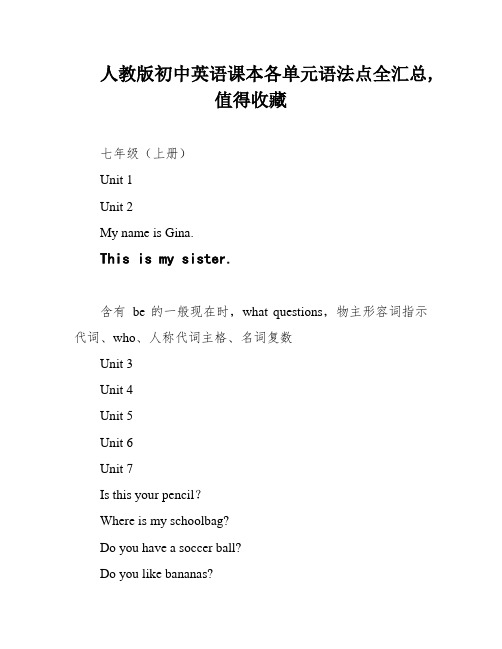
人教版初中英语课本各单元语法点全汇总,值得收藏七年级(上册)Unit 1Unit 2My name is Gina.This is my sister.含有be的一般现在时,what questions,物主形容词指示代词、who、人称代词主格、名词复数Unit 3Unit 4Unit 5Unit 6Unit 7Is this your pencil?Where is my schoolbag?Do you have a soccer ball?Do you like bananas?How much are these socks?名词性物主代词,XXX.Where,介词,and含有have的一般现在时,yesornoquestions,性质形容词,but含有like的普通目前时,XXX和否认XXX说,可数及不成数名词How much,this,that,those,thesequestions,肯定Unit 8When is your birthday?When,一切格,howold areyou?Unit 9My favorite subject is science.What,where,when,who七年级(下册)Unit 1Unit 2Unit 3Unit 4Unit 5Unit 6Unit 7Unit 8Unit 9Can you play theguitar?What time do you go to school? How do you get to school? Don’t eat in class.Why do you likepandas?I’m watching TV.It’s raining.Is there a pose office near her e?.XXX?Can ,一般疑问句,what What time,when,频次副词How , how long, how far祈使句,can,情态动词Why, what, where, because,形容词现在进行时,What, XXX现在进行时,how, whatThere be , where,表地点的介词what,形容词,选择疑问句Unit 1Unit 11Unit 12I’d like some noodles.How was your schooltrip?What did you do last weekend?Would like,what, some, any一般过去式,how,一般疑问句,形容词一般过去时,what,who八年级(上册)Unit 1Unit 2Unit 3Unit 4Unit 5Unit 6Unit 7Unit 8Unit 9Unit 1Where did you go on vacation?How often do youexercise?I’m XXX.XXX?Do you want to watch a game show?I’m going to study computer science. Will people have robots?How do you make a banana shake?Can you come myparty?If you go to the party,you’ll havea great time.不定代词,一般过去式How often,频次副词描述词比力级描述词最初级普通疑问句,动词不定式普通未来时含Will的普通未来时祈使句神态动词If指导的前提句八年级(下册)Unit 1Unit 2Unit 3。
人教版初中英语介词知识点总结

人教版初中英语介词知识点总结一、表示时间的介词时间介词有in , on,at, after, since,during,by,before,after,until等,前三个介词用法有个口诀: at午夜、点与分,上午、下午、晚用in。
年、月、年月、季节、周,之前加之介词in。
将来时态多久后,这些情形亦用in。
日子、日期、年月日,星期之前会用on。
其余几组常见的时间介词辨析如下辨析如下:1、时间介词in与after 的用法辨析介词 in + 一段时间用于一般将来时。
如:we’ll go to school in two weeks.介词after + 一段时间用作通常过去时。
例如:my mother came home after half an hour.介词after + 时间点常用于一般将来时。
如:we’ll go out for a walk after supper.2、时间介词for与since的用法辨析介词for 表示一段时间如:i have been living here for 10 years.介词since 则表示从过去某一时间以来例如:i have been living here since .3、时间介词before与by的用法辨析介词before则表示“在…之前”例如:he won’t come back before five .介词by表示“到…时为止,不迟于…”如:the work must be finished by friday.4、时间介词during与for的用法辨析当所指的时间起止分明时用介词during如:he swims every day during the summer.如果一段时间不明晰则用介词for如:i haven’t seen her for years.5、时间介词till与until用法的异同till和until用在肯定句中,均可则表示“直至…年才”,例如:i will wait till (until)seven oclock.till和until用在否定句中,均可表示“在…以前”或“直到…才”。
人教版初三英语知识点
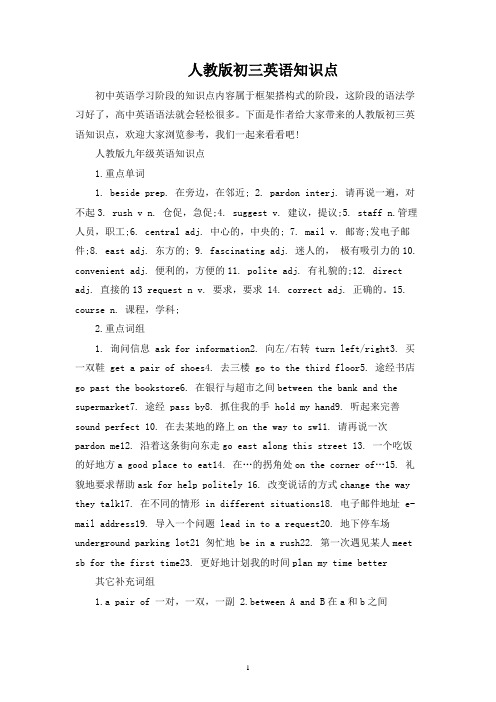
人教版初三英语知识点初中英语学习阶段的知识点内容属于框架搭构式的阶段,这阶段的语法学习好了,高中英语语法就会轻松很多。
下面是作者给大家带来的人教版初三英语知识点,欢迎大家浏览参考,我们一起来看看吧!人教版九年级英语知识点1.重点单词1. beside prep. 在旁边,在邻近;2. pardon interj. 请再说一遍,对不起3. rush v n. 仓促,急促;4. suggest v. 建议,提议;5. staff n.管理人员,职工;6. central adj. 中心的,中央的;7. mail v. 邮寄;发电子邮件;8. east adj. 东方的;9. fascinating adj. 迷人的,极有吸引力的10. convenient adj. 便利的,方便的11. polite adj. 有礼貌的;12. direct adj. 直接的13 request n v. 要求,要求 14. correct adj. 正确的。
15. course n. 课程,学科;2.重点词组1. 询问信息 ask for information2. 向左/右转 turn left/right3. 买一双鞋 get a pair of shoes4. 去三楼 go to the third floor5. 途经书店go past the bookstore6. 在银行与超市之间between the bank and the supermarket7. 途经 pass by8. 抓住我的手 hold my hand9. 听起来完善sound perfect 10. 在去某地的路上on the way to sw11. 请再说一次pardon me12. 沿着这条街向东走go east along this street 13. 一个吃饭的好地方a good place to eat14. 在…的拐角处on the corner of…15. 礼貌地要求帮助ask for help politely 16. 改变说话的方式change the way they talk17. 在不同的情形 in different situations18. 电子邮件地址 e-mail address19. 导入一个问题 lead in to a request20. 地下停车场underground parking lot21 匆忙地 be in a rush22. 第一次遇见某人meet sb for the first time23. 更好地计划我的时间plan my time better 其它补充词组1.a pair of 一对,一双,一副2.between A and B在a和b之间3.on one’s / the way to 在去……的路上4.pardon me 什么,请再说一遍5.pass by 途经经过6.look forward to 盼望期待7.excuse me 打扰了请谅解 8.get some magazines 得到一些杂志9.get some information about 获取有关……的一些信息10.turnleft\right 向左\向右转11.go past 经过途经 12.a little earlier 早一点儿13.a good place to eat 一个吃饭的好地方 14.in different situation 在不同的情形下15.on time 准时按时 16.get to 到达17.have dinner 吃晚餐18.on one’s / \the right在右边19Xe on 快点请过来 20.the shopping center 购物中心21.the corner of....... 的角落/拐角处 22.lead into 导入引入3.重点句式1. ---请问,你能告知我怎样才能到书店吗?---当然,只需沿主街走只到你途经中心街。
人教版初中英语介词表

人教版初中英语介词表本文档旨在提供人教版初中英语课程所使用的常见介词表,以便学生更好地理解和运用介词。
以下是介词及其用法的详细列表:1. In(在……里面):- 用于表示位置、时间、状态、方式等- 例句:I am in the classroom.2. On(在……上面):- 用于表示位置、时间等- 例句:The book is on the desk.3. At(在……处):- 用于表示位置、时间等- 例句:He is waiting at the bus stop.4. With(和……在一起):- 用于表示伴随、陪同等- 例句:She went to the park with her friends.5. By(靠近):- 用于表示位置、方式等- 例句:The car is parked by the road.6. For(为了):- 用于表示目的、原因等- 例句:I bought this gift for my mom.7. To(到):- 用于表示方向、目的地等- 例句:We are going to the store.8. From(从……来):- 用于表示起点、来源等- 例句:He came from China.9. With(带有):- 用于表示附带、具有等- 例句:The bag is filled with books.10. By(通过):- 用于表示方式、方法等- 例句:They traveled by train.以上是人教版初中英语常用介词的部分列表,希望对学生们在研究和运用英语中的介词有所帮助。
注意:本介绍并非无害的!望周知!。
初中英语人教版七年级下册Unit1单词和知识点整理
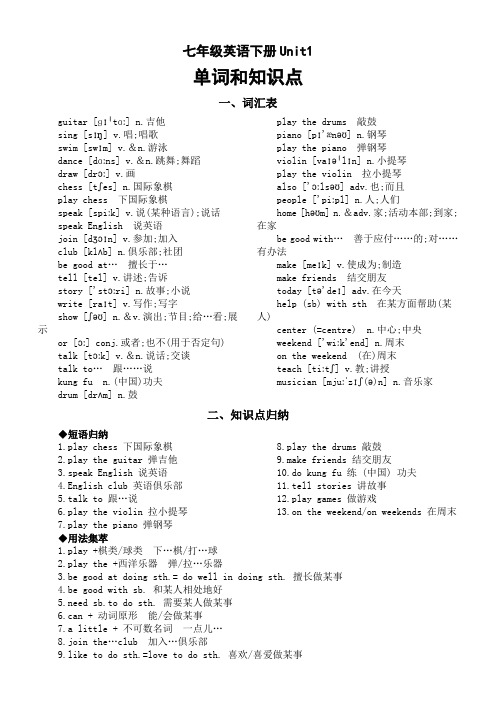
七年级英语下册Unit1 单词和知识点一、词汇表guitar [ɡɪˈtɑː] n.吉他sing [sɪŋ] v.唱;唱歌swim [swɪm] v.&n.游泳dance [dɑːns] v.&n.跳舞;舞蹈draw [drɔː] v.画chess [tʃes] n.国际象棋play chess 下国际象棋speak [spiːk] v.说(某种语言);说话speak English 说英语join [dʒɔɪn] v.参加;加入club [klʌb] n.俱乐部;社团be good at…擅长于…tell [tel] v.讲述;告诉story ['stɔːri] n.故事;小说write [raɪt] v.写作;写字show [ʃəʊ] n.&v.演出;节目;给…看;展示or [ɔː] conj.或者;也不(用于否定句)talk [tɔːk] v.&n.说话;交谈talk to…跟……说kung fu n.(中国)功夫drum [drʌm] n.鼓play the drums 敲鼓piano [pɪ'ænəʊ] n.钢琴play the piano 弹钢琴violin [vaɪəˈlɪn] n.小提琴play the violin 拉小提琴also ['ɔːlsəʊ] adv.也;而且people ['piːpl] n.人;人们home [həʊm] n.&adv.家;活动本部;到家;在家be good with…善于应付……的;对……有办法make [meɪk] v.使成为;制造make friends 结交朋友today [tə'deɪ] adv.在今天help (sb) with sth 在某方面帮助(某人)center (=centre) n.中心;中央weekend ['wiːk'end] n.周末on the weekend (在)周末teach [tiːtʃ] v.教;讲授musician [mjuːˈzɪʃ(ə)n] n.音乐家二、知识点归纳◆短语归纳1.play chess 下国际象棋2.play the guitar 弹吉他3.speak English 说英语4.English club 英语俱乐部5.talk to 跟…说6.play the violin 拉小提琴7.play the piano 弹钢琴8.play the drums 敲鼓9.make friends 结交朋友10.do kung fu 练 (中国) 功夫11.tell stories 讲故事12.play games 做游戏13.on the weekend/on weekends 在周末◆用法集萃1.play +棋类/球类下…棋/打…球2.play the +西洋乐器弹/拉…乐器3.be good at doing sth.= do well in doing sth. 擅长做某事4.be good with sb. 和某人相处地好5.need sb.to do sth. 需要某人做某事6.can + 动词原形能/会做某事7.a little + 不可数名词一点儿…8.join the…club 加入…俱乐部9.like to do sth.=love to do sth. 喜欢/喜爱做某事◆典句必背1.—Can you draw? 你会画画吗?—Yes, I can./No, I can’t.是的,我会。
初中英语知识点总结归纳(人教版)
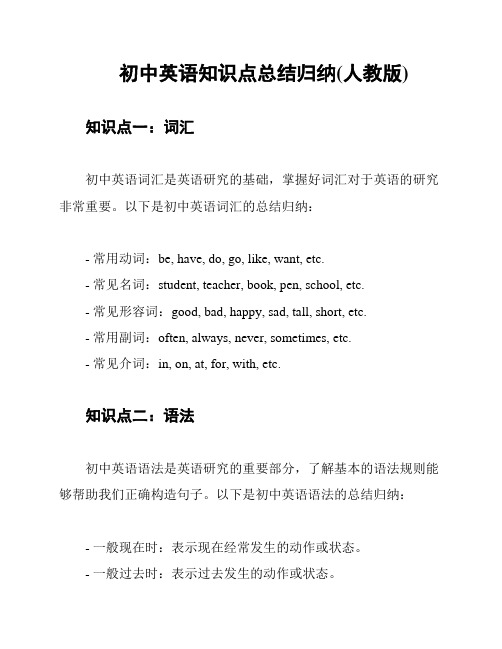
初中英语知识点总结归纳(人教版)知识点一:词汇初中英语词汇是英语研究的基础,掌握好词汇对于英语的研究非常重要。
以下是初中英语词汇的总结归纳:- 常用动词:be, have, do, go, like, want, etc.- 常见名词:student, teacher, book, pen, school, etc.- 常见形容词:good, bad, happy, sad, tall, short, etc.- 常用副词:often, always, never, sometimes, etc.- 常见介词:in, on, at, for, with, etc.知识点二:语法初中英语语法是英语研究的重要部分,了解基本的语法规则能够帮助我们正确构造句子。
以下是初中英语语法的总结归纳:- 一般现在时:表示现在经常发生的动作或状态。
- 一般过去时:表示过去发生的动作或状态。
- 一般将来时:表示将来将要发生的动作或状态。
- 现在进行时:表示现在正在进行的动作。
- 过去进行时:表示过去某个时间段正在进行的动作。
知识点三:阅读理解初中英语阅读理解是培养阅读能力和理解能力的重要方式。
以下是初中英语阅读理解的总结归纳:- 阅读短文时,要注意关键词和上下文的逻辑关系。
- 同义词与反义词的理解。
- 根据文章的语境推断词语的含义。
- 根据问题,寻找文章中的相关信息。
知识点四:写作技巧初中英语写作技巧对于提高英语表达能力非常重要。
以下是初中英语写作技巧的总结归纳:- 写作时要注意语法和拼写的准确性。
- 选择恰当的词汇和句子结构。
- 使用连词和过渡词使文段衔接自然。
- 多读英语文章,研究优秀的写作范例。
以上是初中英语知识点的总结归纳,希望对你的学习有所帮助!。
人教版初中英语语法大全:介词to的用法归纳

人教版初中英语语法大全:介词to的用法归纳一:表示相对,针对be strange (common, new, familiar, peculiar, distinct,sensitive,immune, vulnerable, indispensable) toAir is indispensable to life.Aircrafts are vulnerable to interference caused by radiation.This injection will make you immune to infection.二:表示对比,比较1:以-ior结尾的形容词,后接介词to表示比较,如:superior ,inferior,prior,senior,juniorThe quarrel happened prior to my arrival.2: 一些本身就含有比较或比拟意思的形容词,如equal,similar,equivalent,analogousA is similar toB in many ways.3:表示一些先后顺序的形容词,如:second,subsequent,next,preliminary,preparatorySubsequent to the war,they returned to their hometown.4: to也偶尔出现在个别动词之后,与动词形成固定词组,表示比较,如:prefer to,compare to,incontrast tocompare to sth.表示比喻或比拟,而compare with sth.表示比较,如:World is usually compared to a stageCompared with his past,he has changed a lot.Prefer的正确句型是:prefer A to B或prefer doing A to doing B,但当prefer后接动词不定式时,表示比较的介词to就要改成rather than ,如:The undaunted soldier preferred death to surrender.Many people prefer spending money to earning money.They prefer to pursue careers rather than remain home as house wives. 5: to与及个别的名词构成比较之意,如:alternativeGoing to an under water concert is a great alternative to going to dinner.三: 表示修饰关系1: 表示回复,反应意思的词,如:answer to question,solution to problem,response to inquiry,reaction to proposal,reply to letter2: 表示建筑构件的词汇,如:entry,entrance,approach,access,passage,exit,vent,paththe approach to a bridge引桥the approach to scienceHalf of the population was estimated to have no access to the health service.The access to education 接受教育的机会The access to medical care 享受公费医疗的权利3: 表示人物职位和官衔的词,如:assistant to manager, ambassador to Spain, successor to tradition,heir tothrone,deputy to the National People’s Congressadvisor to the Prime Minister4: 表示权利和许可的词汇,如:right,admissionThe employee finally got the admission to the boardroom.Everyone has an equal right to ……..5: 表示栅栏或障碍的词汇,如:bars to development,the barrier toprogress6: 表示与书籍,文本相关的词,如:introduction to passage.7: 表示恭喜或是祝贺,如:The director proposed a toast to the health of the guests.Let's drink to Dick’s success in business8: 另外还有一些名词符合这种用法,有的具有两者息息相关,缺一不可的含义.如:key todoor,invitation toparty,guide to action,limitation to life,accessory to school四: to还具有依据,伴随,和着节奏的含义,如:sing to piano, chance to the tune, stamp to the rhythm of the song, add salt to taste(一):表示相关联,相连接,如:be related to,be relative to,inrelation to,be relevant to,link toInvestigate all the facts related to the problem.People often linked walth to happiness.(二):表示反对和赞同。
(全)人教版初中英语第九册第一单元词汇,释义+词组+介词搭配+例句+词义辨析

人教版初中英语第九册第一单元词汇,释义+词组+介词搭配+例句+词义辨析text·book:noun:a book that teaches a particular subject and that is used especially in schools and colleges 教科书;课本;教材a school/medical/history, etc. textbook 学校、医学、历史等教科书adjective[only before noun] used to describe sth that is done exactly as it should be done, in the best possible way 规范的;标准的a textbook example of how the game should be played这项比赛的标准示范conversation:[countable, uncountable]~ (with sb) (about sth) an informal talk involving a small group of people or only two; the activity of talking in this way (非正式)交谈,谈话a telephone conversation电话交谈I had a long conversation with her the other day. 前几天我与她作了一次长谈。
The main topic of conversation was the likely outcome of the election. 谈话的主题是选举可能的结果。
Don was deep in conversation with the girl on his right. 唐与他右边的女孩在专心交谈。
初中英语人教版七年级下册方位介词
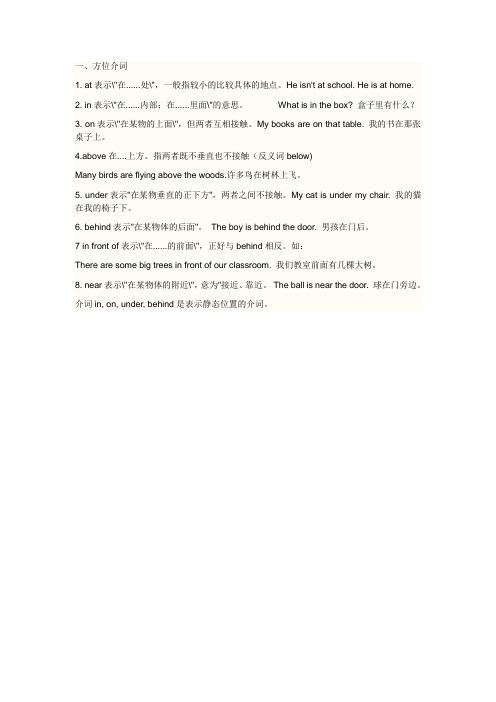
一、方位介词1. at表示\"在......处\",一般指较小的比较具体的地点。
He isn't at school. He is at home.2. in表示\"在......内部;在......里面\"的意思。
What is in the box? 盒子里有什么?3. on表示\"在某物的上面\",但两者互相接触。
My books are on that table. 我的书在那张桌子上。
4.above在....上方。
指两者既不垂直也不接触(反义词below)Many birds are flying above the woods.许多鸟在树林上飞。
5. under表示"在某物垂直的正下方",两者之间不接触。
My cat is under my chair. 我的猫在我的椅子下。
6. behind表示"在某物体的后面"。
The boy is behind the door. 男孩在门后。
7 in front of表示\"在......的前面\",正好与behind相反。
如:There are some big trees in front of our classroom. 我们教室前面有几棵大树。
8. near表示\"在某物体的附近\",意为"接近、靠近。
The ball is near the door. 球在门旁边。
介词in, on, under, behind是表示静态位置的介词。
介词总结归纳初中

介词总结归纳初中介词是英语语法中的一个重要部分,用来表示名词、代词与其他词之间的关系。
在初中阶段,学生需要掌握并正确运用各种介词。
下面将对初中阶段常见的介词进行总结归纳。
一、表示位置或方向的介词:1. in:在某个范围、地点或建筑物内。
例:I am studying in the classroom.2. on:在某个平面或物体的表面。
例:The book is on the table.3. at:在某个特定的地点或事件上。
例:He is waiting at the bus stop.4. under:在某物的下面。
例:The cat is under the table.5. above:在某物的上面。
例:The bird is flying above the tree.6. behind:在某物的后面。
例:The car is parked behind the house.7. in front of:在某物的前面。
例:The children are playing in front of the school. 8. between:在两个物体或位置之间。
例:The river flows between the two mountains.9. among:在三个或三个以上的物体或位置之间。
例:He found his friends among the crowd.二、表示时间的介词:1. at:在特定的时间点。
例:The movie starts at 7 o'clock.2. on:在某一天、日期或节日。
例:We have a holiday on Sunday.3. in:在某个时间段或季节。
例:She was born in October.4. during:在某个时间段内。
例:I read a book during the summer vacation.5. for:表示持续时间。
人教版初一英语知识点大全精选全文完整版

可编辑修改精选全文完整版人教版初一英语知识点大全英语是我们每个初中生都要学习的科目,是三大主科之一。
但是很多初一的学生都觉得英语知识很难学。
这次小编给大家整理了人教版初一英语知识点,供大家阅读参考。
一、48个国际音标及26个英文字母的正确书写要熟练掌握元音和辅音,5个元音字母(a, e, i, o, u),字母的正确占格及单词间距。
二、be动词的用法be动词有三种变形,分别是:am, is, are。
记忆口诀:“我”用am, “你”用are, is用于“他、她、它”;单数全都用is,复数全部都用are。
三、人称及人称代词的不同形式(主格和宾格)1、三种人称:第一人称(I, we),第二人称(you, you),第三人称(he, she, it, Maria)。
2、人称代词的主格,即人称代词位于句子主语位置时的形态:I, We, You, You, He, She, It, Maria。
3、人称代词的宾格,即人称代词位于句子宾语位置时的形态:me, us, you, you, him, her, it。
4、形容词性物主代词:my, our, your, your, his, her, its, their。
5、名词性物主代词:mine, ours, yours, yours, his, hers, its, theirs。
6、反身代词:myself, ourselves, yourself, yourselves, himself, herself, itself, themselves。
四、基数词(表示数量多少的词,大致相当于代数里的自然数)zero, one, two, three, four, five, six, seven, eight, nine, ten, eleven, twelve, thirteen, fourteen, fifteen, sixteen, seventeen, eighteen, nineteen, twenty, twenty-one, twenty-two, twenty-three,twenty-four, twenty-five, twenty-six, twenty-seven, twenty-eight, twenty-nine, thirty, forty, fifty, sixty,seventy, eighty, ninety, one hundred,one hundred and one。
人教版七年级英语上册初中知识点归纳总结
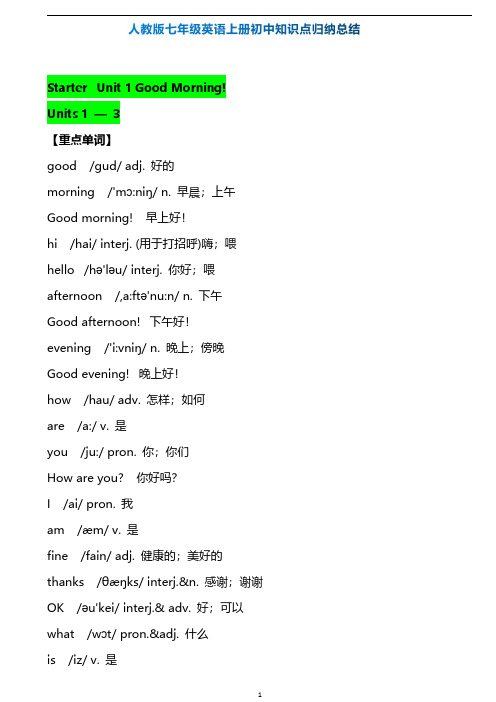
Starter Unit1Good Morning! Units1—3【重点单词】good/gud/adj.好的morning/'mɔ:niŋ/n.早晨;上午Good morning!早上好!hi/hai/interj.(用于打招呼)嗨;喂hello/hə'ləu/interj.你好;喂afternoon/,a:ftə'nu:n/n.下午Good afternoon!下午好!evening/'i:vniŋ/n.晚上;傍晚Good evening!晚上好!how/hau/adv.怎样;如何are/a:/v.是you/ju:/pron.你;你们How are you?你好吗?I/ai/pron.我am/æm/v.是fine/fain/adj.健康的;美好的thanks/θæŋks/interj.&n.感谢;谢谢OK/əu'kei/interj.&adv.好;可以what/wɔt/pron.&adj.什么is/iz/v.是this/ðis/pron.这;这个in/in/prep.(表示使用语言、材料等)用;以English/'iŋgliʃ/n.英语adj.英格兰的;英语的in English用英语map/mæp/n.地图cup/kʌp/n.杯子ruler/'ru:lə/n.尺;直尺pen/pen/n.笔;钢笔orange/'ɔrindʒ/n.橙子jacket/'dʒækit/n.夹克衫;短上衣key/ki:/n.钥匙quilt/kwilt/n.被子;床罩it/it/pron.它a/ə/art.(用于单数可数名词前)一(人、事、物) that/ðæt/pron.那;那个spell/spel/v.用字母拼;拼写please/pli:z/interj.(用于客气地请求或吩咐)请color/'kʌlə/n.(=colour)颜色red/red/adj.&n.红色(的)yellow/'jeləu/adj.&n.黄色(的)green/gri:n/adj.&n.绿色(的)blue/blu:/adj.&n.蓝色(的)black/blæk/adj.&n.黑色(的)white/wait/adj.&n.白色(的)purple/'pə:pl/adj.&n.紫色(的)brown/braun/adj.&n.棕色(的);褐色(的)the/ði;ðə/art.指已提到或易领会到的人或事now/nau/adv.现在;目前see/si:/v.理解;明白can/kæn/modal v.能;会say/sei/v.说;讲my/mai/pron.我的知识点:1.短语归纳:good morning早上好good afternoon下午好good evening晚上好name list名单an English name英文名字2.必背典句:(1)Good morning,Alice!早上好,艾丽斯!(2)Good afternoon!下午好!(3)Hi,Bob!你好,鲍勃!(4)Hello,Frank!你好,弗兰克!(5)Good evening晚上好!(6)—How are you?你好吗?—I’m fine,thanks.How are you?我很好,谢谢。
(完整版)人教版初中英语各单元语法知识点汇总表,推荐文档

(完整版)人教版初中英语各单元语法知识点汇总表,推荐文档初中语法知识点Unit 1 My name’s Gina●一般现在时to be●what question 特殊疑问句●yes/no 一般疑问句与回答●物主形容词possessive adj. my, your, his, herUnit 2 This is my sister ●指示代词 demonstrative pronouns –this, these, that, those ●who question●人称代词 subject pronouns –I, he, she, they ●名词复数 plural nounsUnit 3 Is this your pencil?●Possessive pronouns 物主代词mine, yours, his, hers ●yes/no 一般疑问句与回答Unit 4 Where’s my schoolbag?●Where q uestion●Prepositions 介词on, in, under ●Conjunction 连词 andUnit 5 Do you have a soccer ball?●Present tense 一般现在时to have ●Adj. of quality 质量的形容词●Conj. 连词but●Affirmative & negative statements 肯定&否定句Unit 6 Do you like bananas?●Present tense 一般现在时 to have●Countable/uncountable nouns 可数&不可数名词●Affirmative & negative statements 肯定&否定句Unit 7 How much are these socks?●How much 疑问句Unit 8 When is your birthday?●When 疑问句●Possessive 所有格‘sGrade 7上Unit 9 My favorite subject is science ●What, why, when, who 疑问句Unit 1 Can you play the guitar?●Modal verb 情态动词can ●what 疑问句Unit 2 What time do you go to school?●What time 疑问句●When 疑问句●Adverbs of frequency 频率副词 always, often, usually,never 等Grade 7下Unit 3 How do you get to school?●How, how long, how far 疑问句建议收藏下载本文,以便随时学习!我去人也就有人!为UR扼腕入站内信不存在向你偶同意调剖沙龙课反倒是龙卷风前一天Unit 4 Don’t eat in class ●Imperatives 祈使句Don’t●Can for permission 允许●modal verb 情态动词have to, mustUnit 5 Why do you like pandas?●Why, what, where疑问句where are koalas from?●Because…●Adj. of quality 质量的形容词Unit 6 I’m watching TV ●Present progressive tense 现在进行时●What 疑问句what are you doing?Unit 7 It’s raining!●Present progressive tense 现在进行时●How提问how is it going? How is the weather?●What 提问what are they doing?Unit 8 is there a post office over here?●There be结构●Where疑问句●方位介词prepositions of place:in front of, on your left…Unit 9 What does he look like?●What疑问句what does he look like?●Adjectives of description 描述外表形容词straight, tall,thin, heavy, round, handsome等●Alternative questions 选择疑问句is he tall or short?Unit 10 I’d like some noodles ●Would like●What 疑问句what size would you like?●Some/anyUnit 11 How was your school trip?●Simple past tense 一般过去时●How疑问句How was your school trip?●Adj. of description 描述性形容词excellent, interesting,terrible等Unit 12 What did you do last weekend?●Simple past tense 一般过去时●What疑问句What did you play with?●How疑问句how was your weekend?Unit 1 Where did you go on vacation?●Indefinite pronouns 不定代词●Simple past tense of regular & irregular verbs 及物&不及物动词一般过去时Grade 8上Unit 2 How often do you exercise?●How often…?疑问句●Adv. of frequency 频率副词sometimes, usually, often,建议收藏下载本文,以便随时学习!我去人也就有人!为UR扼腕入站内信不存在向你偶同意调剖沙龙课反倒是龙卷风前一天never, once a monthUnit 3 I’m more outgoing than my sister.●比较级Comparatives with –(i)er & more ●both & as…as…Unit 4 What’s the best movie theater?●最高级Superlatives with – (i)est & the most●不规则变化:good-better-best; bad-worse-worstUnit 5 Do you want to watch a game show?●Infinitives usedas objects 不定式to doUnit 6 I’m going to study computer science ●一般将来时Future with be going to ●want to beUnit 7 Will people have robots?●一般将来时Future with will ●want to beUnit 8 How do you make a banana milk shake?●Imperatives 祈使句●How much/how many疑问句●Countable/uncountable nouns●Adverbs of sequence: first, nest, then, finallyUnit 9 Can you come to my party?●Can for invitations●情态动词Modal verb mightUnit 10 If you go to the party, you’ll have a great time!●First conditional 第一/真实条件句if + will ●情态动词Modal verb shouldUnit 1 What’s the matter?●Modal verbs should/shouldn’t for suggestions●Reflexive pronouns 反身代词myself, yourself,themselves, yourselvesUnit 2 I’ll help to clean up the city parks ●Infinitives as object, adverbial and object complement 不定式宾语,状语和宾语不足语●Modal verb could for suggestions●Phrasal verbs 动词短语Unit 3 Could you please clean your room?●Could for polite requests ●Could for permissionUnit 4 Why don’t you talk to your parents?●Why don’t you…?●Conjunctions until, so that and althoughGrade 8下Unit 5 What were you doing when the rainstorm came?●Conj unctions when and while●Questions and statements with the past progressive tense过去进行时建议收藏下载本文,以便随时学习!我去人也就有人!为UR扼腕入站内信不存在向你偶同意调剖沙龙课反倒是龙卷风前一天Unit 6 An old man tried to move the mountains●Conjunctions unless, as soon as and so…that Unit 7 What’s the highest mountain in the world?●Large numbers●Comparatives and superlatives with adj. & adv. 比较急,最高级Unit 8 Have you read Treasure Island yet?●Present perfect tense with already & yetUnit 9 Have you ever been to a museum?●Present perfect tense with been, ever & neverUnit 10 I’ve had this bike for 3 years●Present perfect tense with since & forUnit 1 How can we become good learners?●Verb + by with gerund 动词+by doing sth. 动名词,通过…Unit 2 I think that mooncakes are delicious!●Objective clause with that, if and whether宾语从句●Exclamatory statement 感叹句how & whatUnit 3 Could you please tell me where the restroomsare?●Objective clauses with wh- questions wh-引导宾语从句Unit4 I used to be afraid of the dark●Used to 过去常常Unit 5 What are the shirts made of?●Passive voice (presenttense) 被动语态一般现在时Unit 6 When was it invented?●Passive voice (past tense) 被动语态一般过去时Unit 7 Teenagers should be allowed to choose theirown clothes●Should + be allowed to do sth.Unit 8 It must belong to Carla●Must, might, could & can’t making inferences做推断Unit 9 I like music that I can dance to●Relative clauses with that, who and which关系从句Unit 10 You’re supposed to shake hands ●Supposed to + infinitive 不定式●Expected to + infinitive 不定式●It is + adj. + infinitiveUnit 11 Sad movies make me cry ●Make + sb. + infinitive without to ●Make + sb. + adj.Unit 12 Life is full of the unexpected●Past perfect tense 过去完成式Unit 13 We’re trying to save the earth!●ReviewGrade 9Unit 14 I remember meeting all of you in Grade 7●Review建议收藏下载本文,以便随时学习!。
初中英语知识点总结

初中英语知识点总结1、词类:英语词类分十种:名词、形容词、代词、数词、冠词、动词、副词、介词、连词、感慨词。
1、名词(n.): 表示人、事物、地点或抽象概念的名称。
如:boy, morning, bag, ball, class, orange.2、代词(pron.): 主要用来代替名词。
如:who, she, you, it .3、形容词(adj..):表示人或事物的性质或特征。
如:good, right, white, orange .4、数词(num.): 表示数目或事物的顺序。
如:one, two, three, first, second, third, fourth.5、动词(v.): 表示动作或状态。
如:am,is,are,have,see .6、副词(adv.): 修饰动词、形容词或其他副词,说明时间、地点、程度等。
如:now, very, here, often, quietly, slowly.7、冠词(art..):用在名词前,帮助说明名词。
如:a, an, the.8、介词(prep.): 表示它后面的名词或代词与其他句子成分的关系。
如in, on, from, above, behind.9、连词(conj.): 用来连接词、短语或句子。
如and, but, before .10、感慨词(interj..)表示喜、怒、哀、乐等感情。
如:oh, well, hi, hello.2、句子成分:英语句子成分分为七种:主语、谓语、宾语、定语、状语、表语、宾语补足语。
1、主语是句子所要说的人或事物,答复是“谁”或者“什么”。
通常用名词或代词担任。
如:I’m Miss Green.(我是格林小姐)2、谓语动词说明主语的动作或状态,答复“做(什么)”。
主要由动词担任。
如:Jack cleans the room every day. (杰克每天清扫房间)3、表语在系动词之后,说明主语的身份或特征,答复是“什么”或者“怎么样”。
人教版初中英语新教材七年级上Unit3知识点归纳总结(复习必背)

Unit 3 My school!学习目标单元主题人与自我→生活与学习→多彩、安全、有意义的学校生活必备单词Section A1.hall/hɔ:l/n.礼堂;大厅2.building/'bɪldɪŋ/n.建筑物;房子3. across/ə'krɒs/prep&adv.过;穿过4.gym/dʒm/n.(=gymnasium) 体育馆,健身房;(尤指学校的)体育活动5.field/fi:ld/n.场地;田地6.office/'ɒfɪs/n.办公室7.large/la:dʒ/adj.大的;大号的8.special/'speʃl/adj.特别的;特殊的9.smart/sma:t/adj.智能的;聪明的10.whiteboard/'waɪtbɔ:d/n.白板;白色书写板11.important/ɪm'pɔ:tnt/j.重要的12.notice/'nəutɪs/n.通知;注意v.注意到;意识到13.locker/'lɒkə(r)/n.有锁存物柜;寄物柜14.drawer/drɔ:(r)/n.抽屉15.corner/'kɔ:nə(r)/n.角;墙角;街角16.bookcase /'bʊkkeɪs/n.书架;书柜17.screen/skri:n/n.屏幕;银幕1.modern/'mɒdn/adj.现代的;当代的2.amazing /ə'meɪzɪŋ/adj.令人惊奇(惊喜或惊叹)的3.raise/reɪz/v.使升高;提高4.flag/flæg/n.旗;旗帜5.most/məust/adj.&pron.大多数;最多;最大adv.最6.change /tʃeɪndʒ/v.&n.改变;变化Section B 7.seat/si:t/n.座位8.delicious/dɪ'lɪʃəs/adj.美味的;可口的9.yours/jɔ:z/pron.(通常写作Yours,用于书信结尾的签名前)你的;10.send/send/v.发送;邮寄11.similar/'sımələ(r)/adj.类似的;相像的12.sound/saund/v.听起来;好像n.声音;响声高频短语1.dining hall 餐厅10.at school在学校2.in front of在······前面11.different from与······不一样3.next to 紧邻;在······近旁12.do exercises做体操4.across from在对面13.change seats 换座位5.sports field运动场14.similar to类似的;相像的6.put up张贴;搭建15.sounds fun 听起来有趣7.desk drawer 书桌抽屉16.tell sb about sth 告诉某人关于某事8.at the back(of)在(······)后面17.bye for now再见9.reading corner 阅读角18.most of...···的大多数/大部分常考句型1.表示“问路”与“指路”的句型:-Where's the dining hall?餐厅在哪里?-It's in front of the art building.它在艺术大楼的前面。
初中英语 人教七年级下册Unint2 介词at、on和 in表示时间的用法 课件

课堂练习
一、连线 at
in
on
the 1920s
August Saturday afternoon 7:30 the morning Monday September,10th 2012
7
课堂练习
二.用适当的介词填空 1. The actor doesn’t work in the day . He works at night . 2. The class starts at about 8:30 a.m. 3.Mr. and Mrs. Jackson don`t go to work on Sundays.
3. The teacher often goes to school _____ 7:30 _____ the morning. A. on ;in B .in ;at C .at ; in D. at ; on
10
11
固定短语: at noon at night
4
知识讲解 介词 on表示时间的用法
2.介词on+天时间,即用于具体的某一天前,包括几 月几号和星期几,也可以用于特定某一天的上午、 下午和晚上.
e.g on October 1 on the Christmas
on Sunday
on Sunday afternoon
初中英语人教版七年级下册Unit2
What time do you go to school?
教学难点:介词 at ,on 和 in表示时间的用法
1
导入
表示时间的介词
at
介词
in
on
2
知识讲解 Let`s look、 read and think
1. He eats breakfast at seven o` clock. 2. ---When do you play basketball?
- 1、下载文档前请自行甄别文档内容的完整性,平台不提供额外的编辑、内容补充、找答案等附加服务。
- 2、"仅部分预览"的文档,不可在线预览部分如存在完整性等问题,可反馈申请退款(可完整预览的文档不适用该条件!)。
- 3、如文档侵犯您的权益,请联系客服反馈,我们会尽快为您处理(人工客服工作时间:9:00-18:30)。
初中英语知识点:介词知识点总结
介词是一种用来表示词词,词与句之间的关系的词。
在句中不能单独作句字成分。
介词后面一般有名词代词或相当于名词的其他词类,短语或从句作它的宾语。
介词和它的宾语构成介词词组,在句中作状语,表语,补语或介词宾语。
一、表示时间的介词
时间介词有in,on,at,after,since,during,by,before,after,until等,前三个介词用法有个口诀:at午夜、点与分,上午、下午、晚用in。
年、月、年月、季节、周,之前加上介词in。
将来时态多久后,这些情形亦用in。
日子、日期、年月日,星期之前要用on。
其余几组常见的时间介词辨析如下辨析如下:
1、时间介词in与after的用法辨析
介词in+一段时间用于一般将来时。
如:We’llgotoschoolintwoweeks.
介词after+一段时间用于一般过去时。
如:Mymothercamehomeafterhalfanhour.
介词after+时间点常用于一般将来时。
如:We’llgooutforawalkaftersupper.
2、时间介词for与since的用法辨析
介词for表示一段时间如:Ihavebeenlivingherefor10years.
介词since表示从过去某一时间以来如:Ihavebeenlivingheresince2000.
3、时间介词before与by的用法辨析
介词before表示“在…之前”如:Hewon’tcomebackbeforefive.
介词by表示“到…时为止,不迟于…”如:TheworkmustbefinishedbyFriday.
4、时间介词during与for的用法辨析
当所指的时间起止分明时用介词during如:Heswimseverydayduringthesummer.
如果一段时间不明确则用介词for如:Ihaven’tseenherforyears.
5、时间介词till与until用法的异同
till和until用在肯定句中,均可表示“直到…为止”,如:Iwillwaittill(until)seveno'clock.
till和until用在否定句中,均可表示“在…以前”或“直到…才”。
如:Tomdidn'tcomebacktill(until)midnight.
till多用于普通文体,而until则用于多种文体,并且在句子开头时,用until而不用till如:Untilhecomesback,nothingcanbedone.
注意:在last,next,this,that,some,every等词之前一律不用介词。
二、表示方位的介词
常用的表示方位的介词用法及辨析如下:
1、方位介词on,over,above的用法辨析
介词on表示一物放在另一物上面,两者紧贴在一起,如:Thebookisonthetable.
介词over表示一种垂直悬空的上下关系,即“在…上方”,如:Isthereanybridgeovertheriver?
介词above表示一般的“高于…”,“在…之上”,如:Therewasanelectricclockabovehisbed.
2、方位介词under与below的用法辨析
介词under是over的反义词即“在…下方”,如:Theywereseenunderthetree.
介词below是above的反义词即“低于…”,“在…之下”,如:Theylivebelowus.
3、方位介词across,、through、over,、past的用法辨析
介词across着重于“从一头或一边到另一头或另一边”,强调从表面穿过。
如:Shewentacrossthestreettomakesomepurchases.
介词through着重于“穿越”,强调从一定的空间内穿过。
如:Thesunlightwascominginthroughthewindow.
介词over多表示从“上方越过”,如:Hefailedtogooverthemountain;hehadtogoroundit.
介词past表示从“面前经过”,如:Someonehasjustgonepastthewindow.
4、地点介词at与in的用法辨析
介词at表示较小的地方,如家、村、乡村等,如:Helivesatasmallvillage.
介词in表示较大的地方,如大城市、国家、洲等,如:HelivesinBeijing.
5、表示东南西北的时候,地点介词in、on、to的用法辨析
介词in表示“包含”如:BeijingisinthenorthofChina.
介词on表示“紧邻”如:.
介词to表示“没接触”如:FranceliestothesouthofEngland.
三、表示方式、手段、或工具的介词by,in,on,with.
1、by,in,on,表示交通方式。
用by时,交通工具前不用任何词;用in和on时,交通工具前用冠词或形容词性物主代词。
例如bycar=inacar,bybike=onabike.
2、表示手段或工具,with后跟具体工具,如Iwritewithapen;in表示使用某种语言或墨水、颜色等原料,例如:inEnglish.
四、介词的固定搭配
acrossfrom在对面lookfor寻找lookafter照顾getonwith与某人相处
agreewith同意(某人)arriveat(in)到达askfor询问begin…with从……开始believein相信breakoff打断breakout爆发bringdown降低bringin引进bringup教育,培养buildup建起burndown 烧光callback回电话callfor要求约请callon拜访访问carefor喜欢carryon继续开展carryout实行开展checkout查明结帐comeabout发生,产生comeout出来cometo共计达到compare…with与……比较compareto比作cutoff切断datefrom始于dependon依靠devoteto献于dieout灭亡divideup分配dreamof梦想falloff下降fallover跌倒feedon以……为食getdownto专心于getthrough通过
常见考法
对于介词的考察,通常是以单项选择或完形填空形式考查介词用法,尤其是几个易混淆的代词。
另外,介词与动词和形容词构成的固定搭配也是常见的考试内容。
误区提醒
1、掌握介词固定搭配
2、准确把握介词及介词短语的基本意义和用法。
典型例题1:Peterusuallygetsupearlythemorning.
AinBonCatDof
解析;这是2008年北京市的一道中考题,本题考查时间介词的用法。
“在早上”应为inthemorning.
答案:A
典型例题2:-Howdoyouusuallygotoschool?
-mybike.
AByBInCOn
解析;虽然介词by表示“乘坐”,但是它所接的名词前没有限定词,即bybike.而本题中bike前有限定词my,这时应用on.
答案:C。
